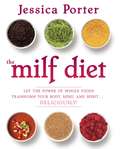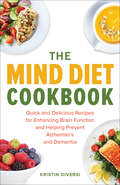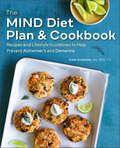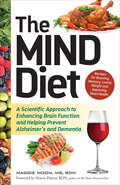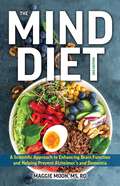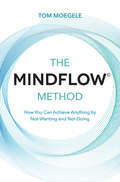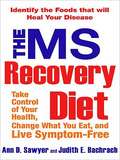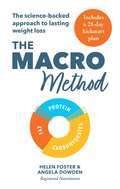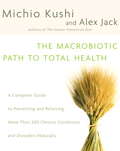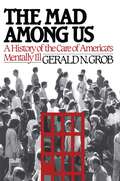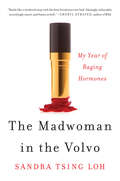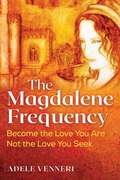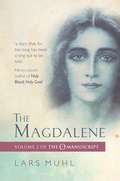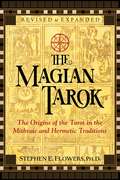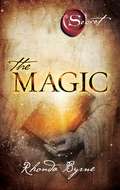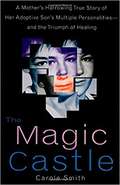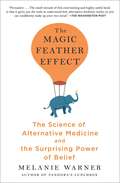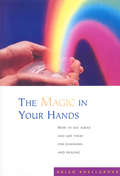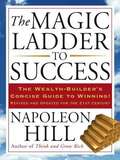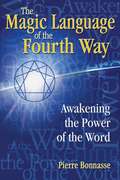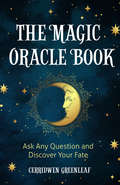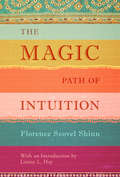- Table View
- List View
The MILF Diet: Let the Power of Whole Foods Transform Your Body, Mind, and Spirit . . . Deliciously!
by Jessica PorterA true milf is confident, sexy, and radiates natural femininity. By eating whole, plant-based foods, you, too, can find balance and dynamic health, and unleash your inner MILF. It's simple: you are what you eat. So, to fulfill your true potential for health, happiness, and MILFiness, it's best to avoid refined sugars, processed foods, dairy, and meat. But it's not as scary as it sounds, and you'll soon discover why. With recipes like Lemony Quinoa Salad; Oven- Roasted Root Vegetables with Garlic, Cumin, and Herbs; Edamame Dip; and Poached Pears with Raspberry Sauce, the MILF Diet is not only easy to follow, it's delicious and slimming, too. Jessica Porter has been a teacher of healthy cooking and hypnotherapy for over fifteen years, and she brings her wealth of knowledge to The MILF Diet in the form of holistic philosophy, mouth-watering recipes, and a fun and digestible enumeration of the health benefits of MILFy foods. By eating the whole, natural, and tasty foods of the MILF Diet, you'll not only turn back the clock and find inner balance, you'll strengthen your immune system and reduce your risk of serious disease. You'll learn why seaweed makes your skin dewy while keeping your hair strong and lustrous, and discover how to harness peak physical energy and mental clarity from whole grains. The best part is, the MILF Diet is simple, delicious, and totally lifechanging.
The MIND Diet Cookbook: Quick and Delicious Recipes for Enhancing Brain Function and Helping Prevent Alzheimer's and Dementia
by Kristin DiversiTHE MIND DIET MADE DELICIOUSPacked with dishes that are not only tasty but also help improve memory, concentration and mental acuity, this handy cookbook makes following the MIND Diet a snap. The 135 easy-to-make recipes provide a mouth-watering way to keep one&’s mind sharp by eating the right foods while avoiding brain-harming ones.The wide range of recipes include quick-and-hearty breakfasts, lunches, snacks, dinners and even sweet desserts made from foods that promote brain health, including:• Pumpkin Muffins• Blueberry Smoothie• Mango Guacamole• Walnut Kale Salad• Salmon Tacos• Creole Shrimp• Rosemary Chicken• Sole Amandine• Beet Hummus• Chocolate Pecan Pie
The MIND Diet Plan & Cookbook: Recipes and Lifestyle Guidelines to Help Prevent Alzheimer's and Dementia
by Julie AndrewsFeed your brain and fuel your health — the MIND Diet Plan and Cookbook.Your cognition can actually be improved by what you eat. The MIND Diet Plan and Cookbook is the definitive guide to the MIND diet (Mediterranean-DASH Intervention for Neurodegenerative Delay)—which studies have shown may reduce the risk of Alzheimer's and other forms of dementia.Start with a comprehensive 4-week meal plan that eases you into the MIND diet. Plan your own meals with detailed serving guides and tons of brain-boosting recipes—including Cherry Oat Smoothies, Fish Tacos with Cabbage Slaw, Moroccan Chicken Tagine, and Crustless Apple Pie. Discover simple lifestyle changes that promote a healthier brain.The MIND Diet Plan and Cookbook features:THE COMPLETE MIND GUIDE—Learn to manage your diet with guides to MIND-friendly ingredients, weekly serving goals, foods to limit, and more.GOODBYE TO GUESSWORK—75+ simple, mouthwatering recipes—plus a 4-week meal plan, complete with weekly shopping lists and prep instructions—make the MIND diet easy.BEYOND THE DINING TABLE—Take the MIND diet to the next level with helpful lifestyle suggestions for enhancing your cognitive health.Everything you need to help keep your brain healthy—The MIND Diet Plan and Cookbook.
The MIND Diet: A Scientific Approach to Enhancing Brain Function and Helping Prevent Alzheimer's and Dementia
by Maggie MoonImprove your brain health and lower your risk of mental decline by following the breakthrough Mediterranean-DASH Intervention for Neurodegenerative Delay.Enjoying a high quality of life as you get older means taking care of your brain as much as your body. And research suggests that what you eat today will help (or hurt) your cognitive abilities later.The MIND Diet explains the science behind mental fitness in an approachable and understandable way. More importantly, this helpful guide presents an easy-to-follow program for keeping your mind sharp by eating the right foods and avoiding brain-harming ones.Packed with dishes that are not only delicious but also help improve memory, concentration and mental acuity, The MIND Diet’s healthy recipes include:Brussels Sprouts FrittataSweet Potato Lentil SoupPistachio Mint CouscousGuacamole-Stuffed TomatoesApricot-Glazed SalmonTango Fish TacosBanana Chocolate CookiesRoasted Chicken with Fennel
The MIND Diet: A Scientific Approach to Enhancing Brain Function and Helping Prevent Alzheimer's and Dementia Fully Updated with New Recipes, Meal Plans, and More Tips and Tools Based on the Latest Research
by Maggie MoonEnhance brain function and help prevent Alzheimer&’s disease and dementia with this fully updated, step-by-step nutrition guide from best-selling author and registered dietitian Maggie Moon.Taking care of yourself doesn&’t just mean focusing on your body—it also means looking after your brain. The MIND Diet, 2nd Edition uses approachable and easy-to-understand language to explain the science behind how you can improve your brain health through nutrition and lifestyle habits. Written by best-selling author Maggie Moon, this fully updated edition offers brand-new content, including: New healthy recipes inspired by cultures from around the world Meal-planning guides Shopping lists Food swaps and alternatives Portion control strategies This second edition of the original classic is perfect for longtime MIND diet fans and for anyone looking to make a lifestyle change to keep their brain healthy!
The MINDFLOW© Method: How You Can Achieve Anything by Not-Wanting and Not-Doing
by Tom MoegeleHow to release negative energy from the body by 'not-wanting' and 'not-doing', from the creator of Mindflow©.The groundbreaking MindFlow© Method is your key to finally overcoming anxiety, combating stress, and tackling emotional blocks, thereby releasing an infinite source of life energy.Through a powerful yet simple combination of movements, you can trigger energy shifts and reconnect to the natural flow of life.This is how the MindFlow Method works: • Using movements similar to Qigong, we tap into the energy field within and around us. • This brings us into a higher state of consciousness (the G4 state) where our bodies release 'happy' hormones that help us relax. • In this state, we can harness any toxic energy that comes our way and use it as our own strength. • This brings us into alignment with our own inner power, calm in the knowledge that we are connected to life energy.Discover the life-changing effects of the MindFlow Method, which will teach you how to release your resistance to challenges, raise your energy level, and move into a state of flow and deep inner peace.
The MS Recovery Diet: Identify the Foods That Will Heal Your Disease
by Ann Sawyer Judith BachrachMore than half a million people live with multiple sclerosis, yet conventional medicine still has little to offer patients. There is no known cure-and even recent breakthroughs in drug therapy do not work to control many of the symptoms or promise any degree of recovery. But there is an alternative to drugs that can stop and reverse the ravaging symptoms of MS-the MS Recovery Diet. As this book explains, there are five common food triggers that can set off the symptoms of MS-dairy, grains containing glutens, legumes, eggs, and yeast. Yet because MS is such a complex disease, other foods play a role, as culprits or aides. The MS Recovery Diet explains the background, science, and development of this treatment in one source for the first time, and shows readers how to pinpoint their specific problem foods and sensitivities. It also offers more than one hundred simple recipes, as well as strategies to improve digestion, balance the immune system, and repair the body's myelin-crucial steps toward healing the body. Both of the authors, Ann D. Sawyer and Judith E. Bachrach, who had been diagnosed and disabled by multiple sclerosis, have experienced incredible recovery on the diet. Within the first three months on this program, Sawyer was able to stop the disease progression and begin to walk short distances with an even gait. Bachrach, whose health has been declining because of MS for thirty- eight years, regained feeling in her toes in one week and after one year on the diet, has stopped taking all medication. This book shares the treatment plan that has dramatically changed their lives, and the lives of others who have discovered it. With inspiring personal stories throughout, it offers real help- and hope-for sufferers of MS.
The Macro Method: The science-backed approach to lasting weight loss
by Helen Foster Angela DowdenSay goodbye to calorie counting with this revolutionary weight-loss method.Macronutrients or 'macros' are the three main nutrient groups your body can't live without: carbohydrates, fats and protein.So many diets focus on calorie counting, but not all calories are created equal: your body doesn't process 20 calories of kale and 20 calories of chocolate in the same way because of their different macro breakdowns.Macro counting is all about balance. By eating the right ratio of carbohydrates, fats and protein, you can lose weight and build muscle in a healthy, sustainable way without avoiding the foods you love. This flexible approach to dieting encourages you to make smart food choices that guarantee results.The Macro Method will tell you everything you need to know about counting macros, including the latest research about how the diet works and its nutritional benefits. The 21-day plan will help you ditch the calorie counting for good, with more than 40 simple recipes to tempt you.
The Macro Method: The science-backed approach to lasting weight loss
by Helen Foster Angela DowdenSay goodbye to calorie counting with this revolutionary weight-loss method.Macronutrients or 'macros' are the three main nutrient groups your body can't live without: carbohydrates, fats and protein.So many diets focus on calorie counting, but not all calories are created equal: your body doesn't process 20 calories of kale and 20 calories of chocolate in the same way because of their different macro breakdowns.Macro counting is all about balance. By eating the right ratio of carbohydrates, fats and protein, you can lose weight and build muscle in a healthy, sustainable way without avoiding the foods you love. This flexible approach to dieting encourages you to make smart food choices that guarantee results.The Macro Method will tell you everything you need to know about counting macros, including the latest research about how the diet works and its nutritional benefits. The 21-day plan will help you ditch the calorie counting for good, with more than 40 simple recipes to tempt you.
The Macrobiotic Path to Total Health: A Complete Guide to Naturally Preventing and Relieving More Than 200 Chronic Conditions and Disorders
by Alex Jack Michio Kushi“Food is the chief of all things, the universal medicine. . . . Food transmutes directly into body, mind, and spirit . . . creates our day-to-day health and happiness. ” —fromThe Macrobiotic Path to Total Health Even in medical schools, alternative medicine is blossoming. Two thirds of them now offer courses in complementary healing practices, including nutrition. At the heart of this revolution is macrobiotics, a simple, elegant, and delicious way of eating whose health benefits are being confirmed at an impressive rate by researchers around the world. Macrobiotics is based on the laws of yin and yang—the complementary energies that flow throughout the universe and quicken every cell of our bodies and every morsel of the food we eat. Michio Kushi and Alex Jack, distinguished educators of the macrobiotic way, believe that almost every human ailment from the common cold to cancer can be helped, and often cured, by balancing the flow of energy (theki) inside us. The most effective way to do this is to eat the right foods, according to our individual day-to-day needs. Now in this marvelous guide, they give us the basics of macrobiotic eating and living, and explain how to use this powerful source of healing to become healthier and happier, to prevent or relieve more than two hundred ailments, conditions, or disorders—both physical and psychological. This encyclopedic compendium of macrobiotic fundamentals, remedies, menus, and recipes takes into account the newest thinking and evolving practices within the macrobiotic community. The authors integrate all the information into a remarkable A to Z guide to macrobiotic healing—from AIDS, allergies, and arthritis, to cancer, diabetes, and heart disease. They also clearly explain what we need to know to start eating a true macrobiotic diet that will provide us with a complete balance of energy and nutrients. Living as we all do in environmental and climactic circumstances that are largely outside our personal control, it is vital that we follow a healthy lifestyle, including a flexible diet that we can adjust to meet our own individual needs. The Macrobiotic Path to Total Healthgives us precisely the tools and the understanding we need to achieve this goal. Use it to build a strong, active body and a cheerful, resourceful mind. From the Hardcover edition.
The Macrobiotic Way
by Michio Kushi Wendy Esko Stephen BlauerThe third edition of the "bible" of the macrobiotic movement. Originally published in 1985, The Macrobiotic Way is a classic in its field. It is the definitive guide to macrobiotics, an approach to diet and lifestyle that promotes both inner peace and harmony with others and the environment. Now updated, it covers not only the central dietary principles, nutrition, and foods but also cooking techniques, essentials for a macrobiotic kitchen, menus and recipes, along with exercise, life philosophy, home and lifestyle, and the role of macrobiotics in healing.
The Mad Among Us: A History of the Care of America's Mentally Ill
by Gerald N. GrobAmericans want to be humane toward the mentally ill, yet we have always been divided about what is best for them and for society. Now, the foremost historian of the care of the mentally ill compellingly recounts our various attempts to solve this ever-present dilemma. In the first comprehensive one-volume history of the treatment of the mentally ill, Gerald Grob begins with colonial America, when families and local communities accepted responsibility for their mentally ill members. Their solutions varied, from confinement under lock and key, to granting mentally ill persons a wide measure of autonomy. As American society grew larger and more complex, the first mental hospitals were created to deal with growing numbers of the severely and persistently mentally ill. Grob brings to life the charismatic and innovative individuals who administered these hospitals and shows how they were successful at first in providing humane care and treatment. But under the pressure of too many patients and too few resources, the hospitals subsequently deteriorated into custodial institutions, and Grob charts this transformation. He traces the growth of the psychiatric profession, the change of the mental health field during World War Il, and the use of controversial shock therapies, drugs, and lobotomies. Mounting criticism of some of these techniques and of mental institutions as inhumane places led to the emptying of the hospitals and a new emphasis on community care and treatment. Americans daily encounter the pitiful sight of homeless, mentally ill people in the streets of our cities, and wonder how it came to be this way. Grob shows that while many patients benefited from the new community policies, there arose a new group of mentally ill substance abusers who desperately need treatment but who resist it. He argues that these people, and not deinstitutionalized patients, make up most of the disturbed homeless who confront us today. Their presence demands new solutions, and Grob's definitive history points the way. It is at once an indispensable reference and a call for a humane and balanced policy in the future.
The Madwoman in the Volvo: My Year of Raging Hormones
by Sandra Tsing LohIn a voice that is wry, disarming, and totally candid, Sandra Tsing Loh tells the moving and laugh-out-loud tale of her roller coaster through "the change." This is not your grandmother's menopause story. Loh chronicles utterly relatable, everyday perils: raising preteen daughters, weathering hormonal changes, and going through the ups and downs of a career and a relationship. She writes also about an affair and the explosion of her marriage, the pressures of keeping her daughters off Facebook while managing the legal and marital hijinks of her eighty-nine-year-old dad, and a despairing withdrawal to a tiny cabin where she combined wine and Ambien, paralyzing her arm into a claw. In one outrageous chapter, a hormonal Loh finds herself trekking to her preteen daughter's school to confront a ten-year-old bully half her size. In another she attempts to subsist on only zero-calorie noodles and the occasional fat-free yogurt in a hopeless effort to vanquish added midlife weight. In The Madwoman in the Volvo Loh speaks hilariously and honestly about her life as a mother, a daughter, and an artist. She recounts her journey through a tumultuous time of life, trying to maintain appearances during an epic hormonal--and that means physical, emotional, mental, and spiritual--change. The upbeat conclusion: it does get better.
The Magdalene Frequency: Become the Love You Are, Not the Love You Seek
by Adele VenneriAn initiatory journey to unite the Feminine and Masculine within your soul and discover the Divine Love within• Reveals how Mary Magdalene, Myriam, is not a biblical myth but an ancient frequency of the soul, a reverberation of the alchemy of Feminine and Masculine• Presents ancestral knowledge embedded with the frequency of Myriam through which you can discover your complete soul• Reveals new Akashic rooms where you can become aware of your multidimensionality, learn to create your own reality, and connect with Myriam and feminine and masculine archetypesMany of us are feeling incompleteness at the soul level and experiencing the urgent need to restore the feminine part of our souls. But this missing part cannot be found by looking outside the self, by seeking love from another, whether, romantic, familial, or spiritual. Nor can it be found by replacing masculine energy with feminine. The lack we feel can only be healed by rediscovering Divine Love, the union of Feminine and Masculine, within each of us and activating our memories of who we truly are.Leading you on a step-by-step initiatory journey, Adele Venneri reveals how Mary Magdalene, or Myriam, is not a biblical myth, but an ancient frequency of the soul. She explains how she awakened to Myriam and was transformed from seeking outward love, which only led to suffering, to realizing that true love, true self, comes from within. Through ancestral knowledge, embedded with the frequency of Myriam, the author shows you how to stop judging and forgive yourself, reunite your feminine and your masculine, merge your light body into the physical body, and rediscover your complete soul by embodying the Magdalene frequency. She reveals new Akashic rooms where you can become aware of your multidimensionality, learn to create your own reality, and connect with Myriam and feminine and masculine archetypes.Revealing how to become the love you are rather than the love you seek, how to take on the responsibility for being the Creator of your own life, this alchemical text will transform you through the Magdalene Frequency and teach you at the soul level that you are worthy, you are joy, you are what you have always sought.
The Magdalene: Volume II of the O Manucript
by Lars Muhl‘A story that, for too long, has been crying out to be told’ Henry Lincoln, author of Holy Blood, Holy Grail ‘The heights that the climb may lead you to are in proportion to the depths to which you are willing to delve’ Mary Magdalene is arguably one of Jesus’ best-known disciples and yet we know very little about her. From the writing of the New Testament to the filming of The Da Vinci Code, her image has been repeatedly conscripted, contorted and contradicted. Mary is considered by many as an outcast, underserving of Jesus’s love. In this follow up book to The Seer, we join Lars Muhl as he seeks to find out more about the intimate relationship between Jesus (Yeshua) and Mary Magdalene. This is the story of a forgotten feminine power recounted in parallel to the author’s journey. The Magdalene is the second book in the Grail Trilogy, otherwise known as The O Manuscript
The Magian Tarok: The Origins of the Tarot in the Mithraic and Hermetic Traditions
by Stephen E. FlowersReveals the historical roots of the symbology of the Tarot in the Mithraic tradition of the Persian Magi and the Hermetic tradition • Explores the Magian teachings on the Stoeicheia and how this magical alphabet was the template for the Tarot • Explains how the sequencing of the Major Arcana is related to the images used in Mithraic initiation • Looks at the original meanings of the Major Arcana using Mithraic symbolism, as well as the deep-level connections of the Tarot with Egypt, the Romani people, the Semitic tradition, and runes The Tarot is a mythic map of the world and of consciousness. It offers a meta-language of signs and symbols that communicate their meaning precisely. Yet the true origins of the Tarot remain shrouded in mystery. These oracular cards have long been thought to have come from Egypt or from the “Gypsies,” but as Stephen E. Flowers reveals, their original roots lie in the Mithraic tradition of the Persian Magi. In this book, Flowers explores the historical roots and mythology of the symbolic images that became known as the Tarot. Drawing on theories first pioneered by the Swedish scholar Sigurd Agrell (1881-1937), he reveals the genesis of the Tarot’s symbolism in the great Hermetic tradition at the same time the Magical Papyri were being written in Greco-Roman Egypt. He explains how the sequencing of the Major Arcana is related to the images used in Mithraic initiation, elements of which were then integrated into existing Roman and Egyptian traditions. Exploring the Magian teachings on the Stoeicheia, an alphabet that acted as a map for understanding the order of the cosmos, he demonstrates how this alphabet of magical symbols was the template for the Tarot. The author also shows how the 22 Major Arcana cards were related to the 22 letters of the Roman alphabet used for oracular purposes in ancient times. Looking in-depth at the principles of Mithraism, the author explains how the Roman form of Mithraism, a guiding factor in the early shaping of the Tarot, was itself a synthesis of Iranian Magianism, Greek stoicism, Babylonian astrology, and Greco-Egyptian Hermeticism. Exploring the cards themselves, Flowers then looks at the original meanings of the Major Arcana using Mithraic symbolism and its offshoots. He also explains the truth behind many of the myths surrounding the Tarot, including their deep-level connections with Egypt, the Romani people, the Semitic tradition, and runes. By restoring the original mysteria to the icons of the Tarot and learning their true origins, we can better understand the insight these powerful cards impart in divination.
The Magic (The\secret Library #3)
by Rhonda ByrneIn The Magica great mystery from a sacred text is revealed, and with this knowledge Rhonda Byrne takes the reader on a life-changing journey for 28 days. Step by step, day-by-day, secret teachings, revelations, and scientific law are brought together to form 28 simple practices that open the reader's eyes to a new world, and lead them to a dream life.
The Magic Castle: A Mother's Harrowing True Story of Her Adoptive Son's Multiple Personalities and the Triumph of Healing
by Carole Smith"This is a true account of my experiences in successfully raising a child who suffered from multiple personality disorder. In writing the book, I have made extensive use of notes I took during therapy sessions and directly after encounters with alters, mental health personnel, a child placement organization, and the office of the district attorney. Occasionally, I have combined several similar events to avoid repetition. I was not present at the original incidents but I did observe many revivifications of the actual events. My belief in the truth of the personalities' revelations is based upon physical and circumstantial evidence and also occasional verification from witnesses. All of my encounters with the alters, including revivifications, have been accurately depicted and have not been exaggerated in any way. Many names, locations, and identifying details, including those of my family, have been changed or modified. The only names used in this book that have not been altered are those of Bill Conti, Dr. Steven J. Kingsbury, Dr. Nina Fish-Murray, Marie Párente, and Dr. Van der Kolk. The names of places and institutions that have not been changed are Boston Children's Hospital; Camp Wedicko; County District Attorneys Office; Massachusetts Department of Social Services; Massachusetts Mental Health Center; Mount Auburn Hospital; Northboro, Massachusetts; Robert F. Kennedy Residential School; and University of Massachusetts Acute Adolescent Psychiatric Unit at Westboro. As a final note, when he was thirteen years old, my son wanted to sever all connections to the perpetrators and asked to have his first, middle, and last names changed. I gave him an old family name of mine, my husband's middle name, and, of course, our last name. It is important that the reader know of these changes. However, throughout this book I have simply called him Alex."
The Magic Feather Effect: The Science of Alternative Medicine and the Surprising Power of Belief
by Melanie WarnerThe acclaimed author of Pandora’s Lunchbox and former New York Times reporter takes an enlightening, engaging deep dive into the world of alternative medicine and the surprising science that explains why it may work.We all know someone who has had a seemingly miraculous cure from an alternative form of medicine: a friend whose chronic back pain vanished after sessions with an acupuncturist or chiropractor; a relative with digestive issues who recovered with herbal remedies; a colleague whose autoimmune disorder went into sudden inexplicable remission thanks to an energy healer or healing retreat. The tales are far too common to be complete fabrications, yet too anecdotal and outside the medical mainstream to be taken seriously scientifically. How do we explain them and the growing popularity of alternative medicine more generally? Is there a biological basis for practices like acupuncture, tai chi, chiropractic, and energy healing? Who are the faithful patients and practitioners who tell these stories and speak of such mystical-seeming concepts as qi, chakras, and meridians in the first place? In The Magic Feather Effect, author and journalist Melanie Warner attempts to answer these questions, taking us on a vivid, fascinating journey through the world of alternative medicine. Crossing continents and sides of the debate, visiting prestigious research clinics and ordinary people’s homes, she investigates the scientific underpinning for the purportedly magical results of these practices and reveals not only the medical power of beliefs and placebo effects, but also the range, limits, and uses of the surprising system of self-healing that resides inside us. Equal parts helpful, illuminating, and compelling, The Magic Feather Effect is a brilliant exploration of some of the world’s most popular health treatments, the people who seek them, the scientists who study them, and the reasons they may work.
The Magic In Your Hands: How to See Auras and Use Them for Diagnosis and Healing
by Brian SnellgroveIn this book Brian Snellgrove will provide you with a method for seeing and tuning into other peoples' auras - their problems, their needs and understanding them, without a requirement for words.The author, who had an international practice in South Africa, Australia, Finland, Ireland and the UK, shares his experience of benign and non-invasive method of analysis.Of use to counsellors, therapists, healers, sensitives - in fact anyone having to do with human nature in all its aspects - this technique is a well-tested and accurate way of determining how clients can be most effectively helped to understand and face their circumstances.
The Magic Ladder to Success
by Napoleon HillA primer in success-building, The Magic Ladder to Success is Hill's compact distillation of his lifetime of learning. The Magic Ladder to Success is the volume in which Napoleon Hill first distilled the seventeen factors that make up his "Law of Success" philosophy. These key principles capture the ethics and actions that empower all who harness them to become leaders in the field of their choice. Leaders are not born, Hill argues, they are molded by a remarkably similar, simple, and dynamic set of habits. The Magic Ladder to Success is Napoleon Hill's lost classic-long out of print, it is newly available as a stand-alone edition, revised and updated for the twenty-first century. .
The Magic Language of the Fourth Way: Awakening the Power of the Word
by Pierre BonnasseAn application of Gurdjieffian principles to fully and properly activate the power of language • Explains the relationship between the Gurdjieff enneagram and sacred geometry and harmonics • Shows that the objective power of language--and art and music--lies in the ability to use symbols that will mean precisely the same thing to anyone • Includes a new English translation of René Daumal’s essay “The Holy War” In The Magic Language of the Fourth Way, Pierre Bonnasse applies the esoteric teachings of Fourth Way mystic G. I. Gurdjieff and the insights of initiate René Daumal to show how to fully and properly activate the power of language. Bonnasse shows how words can regain the strange magical powers they possessed in the first days of humanity, when words created the realities of what they described. This is a far cry from today’s world in which even writers lament the impotent nature of language.Bonnasse uses the relationship between the Gurdjieff enneagram and sacred geometry and harmonics to reveal the power given to words by the notes of the scale. He shows not only how to discover the objective power of words but also how to apply the relationship between language and living to maximum effect. He explains that the objective power of language--and art and music--lies in the ability to use symbols that will mean precisely the same thing to anyone. The Magic Language of the Fourth Way serves as a clear and generous introduction to the complexities of Gurdjieffian thought as well as a descriptive how-to manual for Fourth Way aspirants on the uses of objective language for spiritual advancement.
The Magic Oracle Book: Ask Any Question and Discover Your Fate
by Cerridwen GreenleafA Daily Source of Prophetic InspirationOpen this book and find the prophetic answers you’re seeking, or simply an added dose of inspiration for your day.The written version of a magic 8 ball. Have an urgent question? A pressing need? A probing thought? Focus intently on it, flip the pages of this book, and stop the page with your finger. Read the words before you—the results are surprising and satisfactory!Words from the greats. Author Cerridwen Greenleaf, a writing instructor and medieval scholar, has collected quotes from some of the most renowned thinkers, philosophers, poets, and writers of all time. Find excerpts from a number of poets, from William Shakespeare to Emily Dickinson, Rumi to J.R.R. Tolkien. Crystal ball gazing can be intriguing, but nothing is as clear as the written word!Invite peace into your day. Taking a moment to pause and reflect on inspiring words can have a significant impact on your day. This oracle in book form offers you a chance to meditate and forecast your future, and it opens the door for peace to flood in. As the author of a number of books on mysticism, Greenleaf employs the ancient arts of divination and clairomancy in this book to provide guidance, encourage spirituality, and inspire meditation. With this book, she provides readers with an opportunity to cast a simple spell: one of peace, revelation, and mindfulness.Open The Magic Oracle Book and it will reveal…A prophetic tool and a source of inspiration for every dayAnswers for questions that encourage further contemplation and self-discoveryA mindful companion, made up of words from great poets and writers, for your journey into a deeper spiritualityIf other mysticism and mindfulness books have intrigued you, such as The Only Astrology Book You’ll Ever Need, The Golden Book of Fortune-Telling, and The Practical Witch’s Spellbook, then Cerridwen Greenleaf’s The Magic Oracle Book should be next on your list!
The Magic Path of Intuition
by Florence Scovel Shinn"Prayer is telephoning to God, and intuition is God telephoning to you."Florence Scovel Shinn was a gifted teacher who shaped the fields of spiritual growth and New Thought. Her practical, straightforward style empowered countless people to trust their inner knowing and overcome their challenges.With an Introduction by best-selling self-help luminary Louise Hay, who credited Florence as one of her early inspirations, this simple yet poignant book—which contains original, previously unpublished text—can help you positively transform your life. Powerful affirmations will show you how to cultivate your intuition and release any resistance, fear, and doubt.The Magic Path of Intuition offers 10 lessons:1: The Magic Faith of Intuition 2: How to Wind Yourself Up Financially 3: The Magic Path of Intuition 4: How to Break Up Old Thought-Forms 5: Health and Happiness 6: Bringing Your Future into the Now 7: The House That Faith Built 8: Do Not Let Your Heart&’s Desire Become a Heart&’s Disease 9: Infinite Intelligence, the Great Magician 10: All That the Fourth Dimension Affords Is YoursFlorence said, "You must live fully in the now to make your dreams come true." Are you ready to follow your own magic path, your Divine wisdom, and realize your dreams? Goals or wishes that seem far off or unattainable are just waiting for you to believe in your potential and innate ability to manifest your desires!
